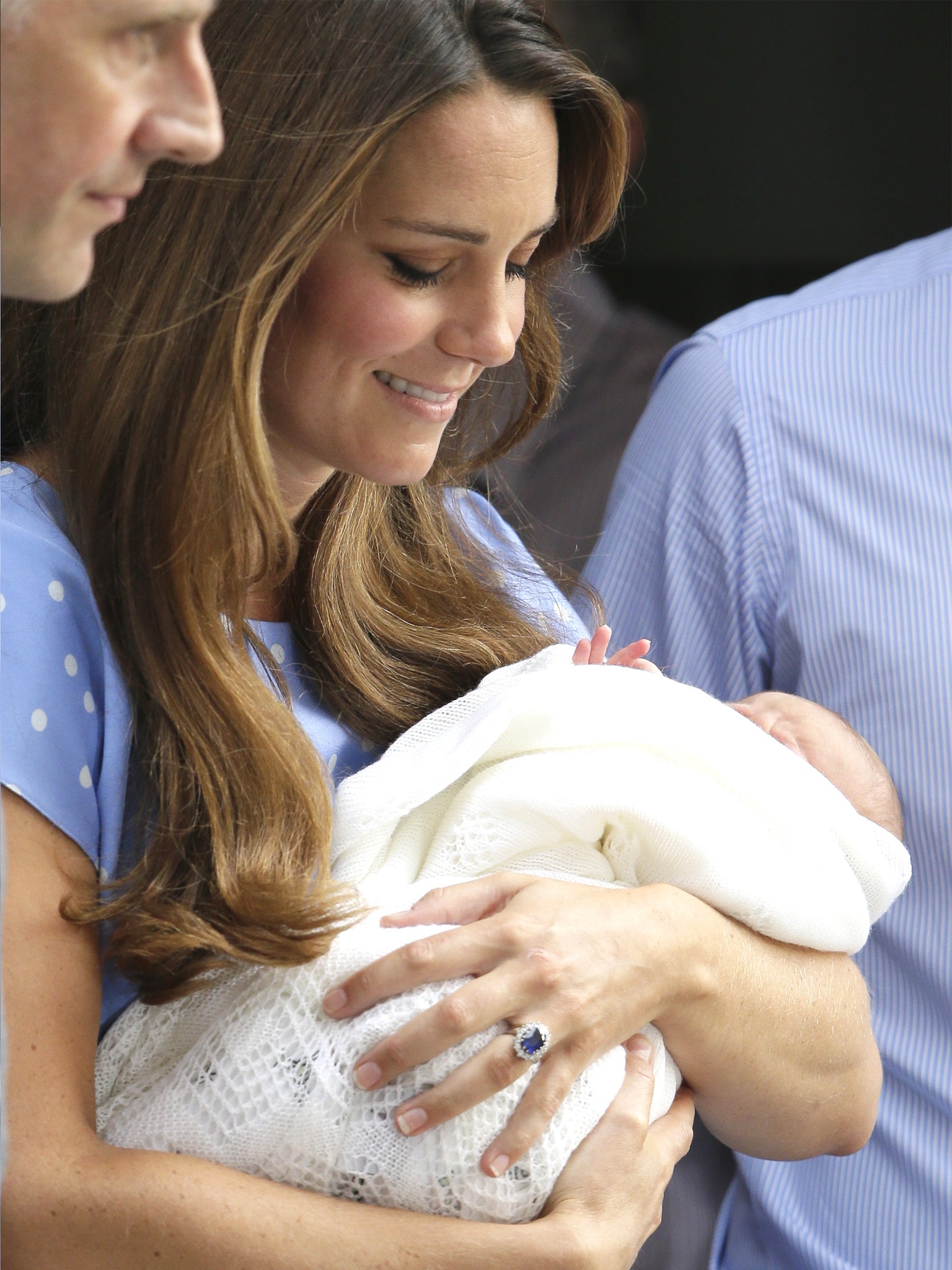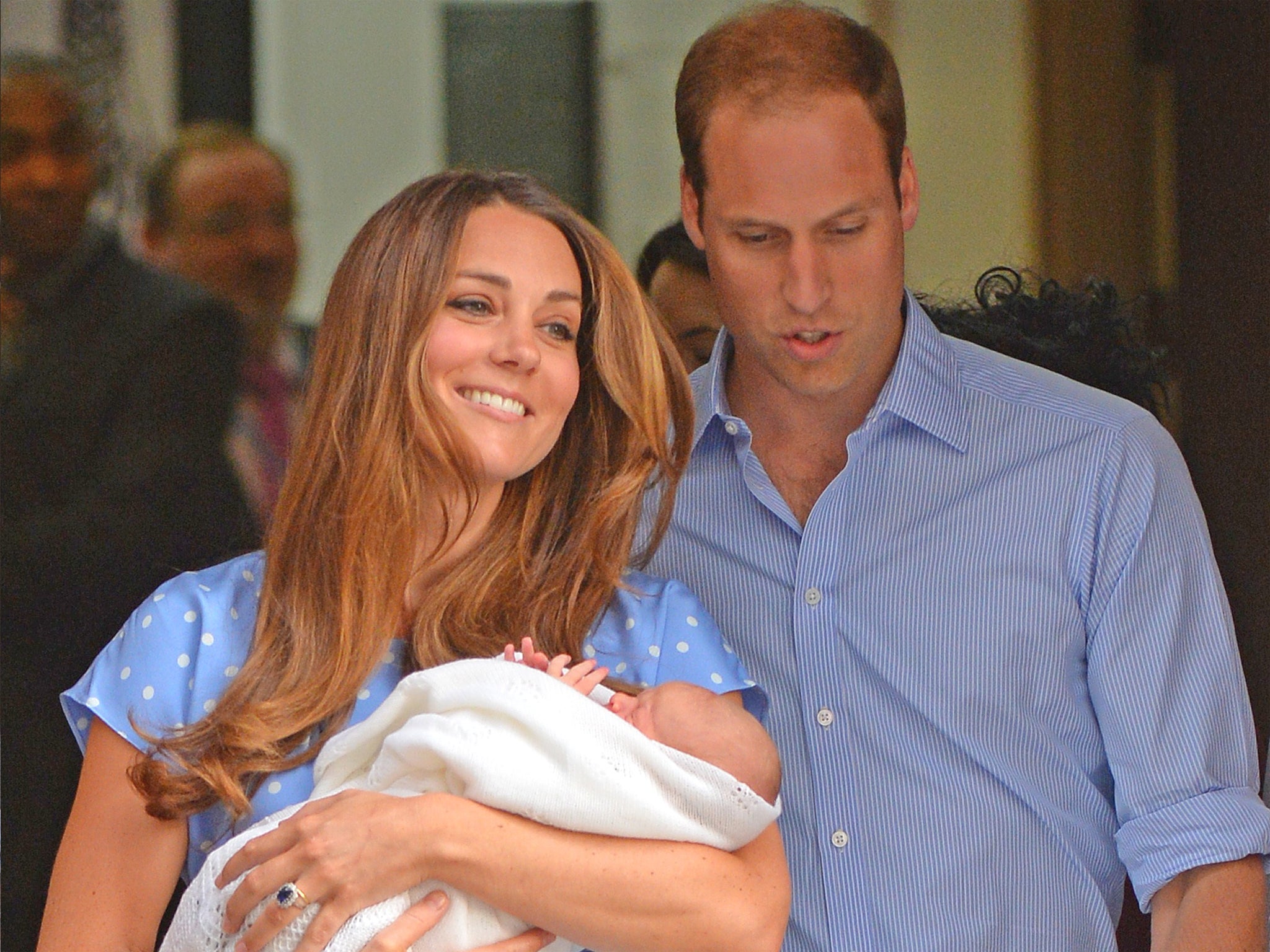Royal baby: Duke and Duchess of Cambridge name son George Alexander Louis
Announcement puts end to weeks of speculation as bookies' favourite comes through
Royal baby: Duke and Duchess of Cambridge name son George Alexander Louis
Show all 8Your support helps us to tell the story
From reproductive rights to climate change to Big Tech, The Independent is on the ground when the story is developing. Whether it's investigating the financials of Elon Musk's pro-Trump PAC or producing our latest documentary, 'The A Word', which shines a light on the American women fighting for reproductive rights, we know how important it is to parse out the facts from the messaging.
At such a critical moment in US history, we need reporters on the ground. Your donation allows us to keep sending journalists to speak to both sides of the story.
The Independent is trusted by Americans across the entire political spectrum. And unlike many other quality news outlets, we choose not to lock Americans out of our reporting and analysis with paywalls. We believe quality journalism should be available to everyone, paid for by those who can afford it.
Your support makes all the difference.The Duke and Duchess of Cambridge have named their son George Alexander Louis, Kensington Palace has confirmed.
The announcement puts an end to weeks of speculation as the most recent bookies' favourite for the Prince of Cambridge's first name was chosen.
Britain seemed convinced that the Duchess would choose the traditional moniker George for her son, with odds sitting at 9/4 this morning, according to Ladbrokes. James was also a popular choice at 4/1. Paddy Power had noticed a surge towards the name Spencer, with odds stacked at 8/1 earlier.
The country had to wait over 24 hours to hear the name chosen for the heir to the throne, but this was not long compared with previous royal births. Royal supporters waited for a week to hear the name chosen for a newborn Prince William, although Prince Harry's name was unveiled upon his exit from the hospital in 1984.
Earlier, the couple were seen leaving Kensington Palace by car with their new-born son, as they reportedly headed to Kate's family home in Bucklebury, Berkshire.
Prince Harry had visited the Duke and Duchess of Cambridge to see his new nephew, Kensington Palace announced. The Queen also arrived at Kensington Palace earlier in the morning to visit Kate, William and her great-grandson for the first time.
Kate and William were welcomed back to the palace by her sister Pippa and other members of the Middleton family, who held a small family celebration.
On Tuesday afternoon, the moment the media had been waiting for finally arrived when William and Kate emerged from the private wing of the Lindo hospital, allowing the world to finally catch a glimpse of the third-in-line to the throne.
The Duke and Duchess posed on the steps of St Mary’s Hospital and presented the world with the future king, answering questions from the media scrum that has camped outside the hospital for weeks anticipating the birth of the royal baby, alongside thousands of well-wishers.
Twitter immediately exploded into a frenzy as soon as the royal baby entered into public view and 18,000 tweets a minute were posted.
The baby prince appeared oblivious to the scrum but did seem to be partially awake during his first public appearance. His hand poked over the white shawl he was wrapped in, prompting many to take to Twitter and comment on the little prince’s royal wave using #royalwave.

Asked how he felt, William said "very emotional" and the Duchess agreed: ”It's such a special time and I think any parent will probably know what this feeling feels like.“ He also revealed that no name has been chosen for the future heir to the throne. “We are still working on a name so we will have that as soon as we can,” he said. “It's the first time we have seen him really, so we are having a proper chance to catch up.”
William and Kate's appearance outside the Lindo Wing harked back to the day the Duke first emerged into the world outside the same hospital in the arms of the Prince and Princess of Wales in 1982. But the atmosphere was very different this time, as the royal couple were casually dressed and appeared to be at ease.
The birth of a son was also welcomed as an heir to throne, after a bill to amend the rules of succession was rushed through earlier this year to ensure that if the infant had been a girl, it could have still ascended to the throne.
The birth of Baby Cambridge, as he had been referred to by the media and social networks, is historic in many ways. The child is the first Prince of Cambridge to be born for more than 190 years. Charles's visit to the hospital was also an historic moment as it is believed to be the first time three male heirs to the throne - Charles, his son William and now George - who are expected to reign, have come together in more than a hundred years.
The last time a similar gathering happened was likely to have been before Queen Victoria's death in 1901 when her son, later Edward VII, was with his son the future George V and grandson, later Edward VIII.
Prince George, weighing in at a hefty 8lb 6oz, is also the heaviest future king to be born for 100 years. William weighed 7lb 1.5oz when he was born in 1982, whilst the Prince of Wales weighed 7lb 6oz upon his birth.

In the hours before they left hospital William and Kate had received visits from their son's grandparents - Michael and Carole Middleton and the Prince of Wales and Duchess of Cornwall.
Asked how his first grandchild was, Charles replied: "Marvellous, thank you very much, absolutely wonderful." Carole, who was the first to visit her daughter and William with her husband Michael, described her first cuddle with her grandson as "amazing".
Additional reporting by PA
Subscribe to Independent Premium to bookmark this article
Want to bookmark your favourite articles and stories to read or reference later? Start your Independent Premium subscription today.
Join our commenting forum
Join thought-provoking conversations, follow other Independent readers and see their replies
Comments